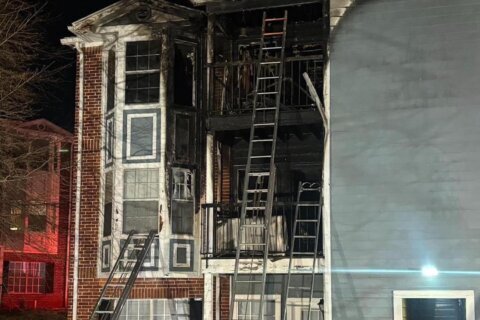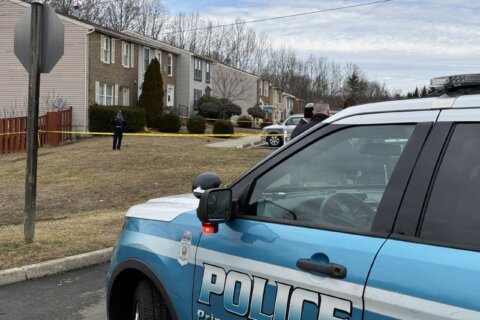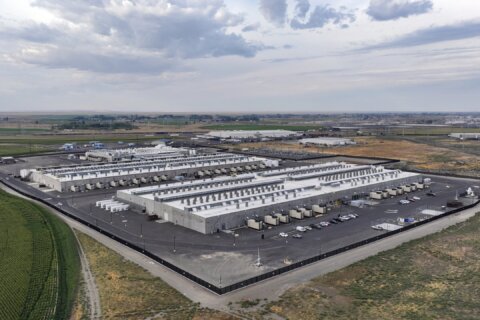This article was written by WTOP’s news partner InsideNoVa.com and republished with permission. Sign up for InsideNoVa.com’s free email subscription today.
The development industry has pumped more than $118,000 into the local campaign committees for seven members of the Prince William County Board of Supervisors and contributed at least $333,000 to two of their congressional campaigns.
The current iteration of the Board of County Supervisors has collected $285,930 between taking office Jan. 1, 2020, and June 30, 2022, for their local campaign committees despite not facing the prospect of an election until 2023, according to state campaign finance reports.
Two supervisors have also raised a combined $1.46 million in congressional campaigns since September 2021.
Developers, construction companies and real estate firms account for about 42% of the fundraising total for the local committees, but only about 23% for the federal campaigns.
Supervisors are allowed to collect campaign contributions while in office, and no state law requires government officials to disclose campaign contributions before discussing public business.
It is not unusual for developers to contribute heavily to candidates for local office because land-use decisions affect their bottom line. Many of the contributions come electronically or through fundraisers.
Officials are required only to disclose personal financial ties to any topic before the governing body under the Virginia State and Local Government Conflict of Interest Act. Therefore, the donations are legal and participation of the supervisors in discussions about topics related to the contributors is allowed under state law.
However, local governments can impose stricter requirements for disclosures. For example, Fairfax County requires members of the Board of Supervisors, Planning Commission and Board of Zoning Appeals to publicly disclose any financial ties including “any gift or donation having a value of more than $100, singularly or in the aggregate.”
Prince William does not have stricter requirements than state law relating to financial disclosures.
“I certainly am open to having those discussions,” said Supervisor Jeanine Lawson, R-Brentsville. “I think it keeps us honest and open and transparent. I’m always open to anything that keeps elected officials honest, open and transparent.”
Stephen Farnsworth, director of the Center for Leadership and Media Studies at the University of Mary Washington, said local campaigns have a smaller fundraising pool and heavily rely on local businesses and developers.
“Although the numbers may be smaller for donations for county office compared to state legislative seats or statewide office, the impact may be much greater,” he said. “There are fewer sources of donations at the county level. That makes the donations that candidates do get all the more valuable.”
Farnsworth said transparency about financial ties to the business of government is a problem at all levels.
“One of the painful realities of campaign finance laws in Virginia is that some of these laws were written for a very different time,” he said. “As county government has gotten bigger, particularly in Northern Virginia, greater disclosure of personal financial interest would be a good thing.”
Supervisors are not required to itemize donations of less than $200 on their state campaign finance reports, therefore some developers or landowners could have contributed small amounts that are not detailed.
Who developers supported
Supervisor Yesli Vega, R-Coles, reported the most contributions from developers to her local committee at $38,700. She also has received $105,147 from developers in her campaign for the 7th Congressional District.
Overall, including congressional campaigns, Lawson received the most contributions from the industry. She reported $228,670 in her unsuccessful bid for the Republican nomination in the 10th District and $16,900 to her local committee.
Lawson said her main campaign fundraising event is a shrimp boil in the fall and that in 2021 her fundraising focus was on her congressional campaign.
Lawson said she follows state code but has some “self-imposed rules.” She doesn’t take contributions from people with pending land-use cases and has returned checks.
“I do believe that it can create at a minimum a perception of a conflict of interest with the public,” she said.
Supervisor Kenny Boddye, D-Occoquan, did not report any contributions from the development industry.
“I think, above all, in these contentious times, it’s important for citizens to feel like lawmakers are making decisions in the best interest of the public,” Farnsworth said. “One of the ways to instill confidence in the public is for lawmakers to hesitate to invest in companies that come before them asking for favors.”
Supervisor Andrea Bailey, D-Potomac, said she has not taken an active role in fundraising while in office.
Vega said she has received money from “mainly just friends and family.”
Vega said of the numbers reported by InsideNoVa, “more than half has come from family members that are contractors or subcontractors which haven’t benefited from any votes I’ve taken while on the board.”
“Anyone that has followed my votes on the board obviously knows that I side much more with our current residents’ wishes to slow down residential development due to its impact on our schools, roads, and local environment than the majority of my colleagues,” she added.
Board Chair Ann Wheeler, D-At-Large, said her fundraising over the past two years was two events open to the public and “two or three fundraising emails.”
“I believe the current system, which consists of public financial disclosures periodically, is serving its purpose as evidenced by your ability to write a detailed article,” she said.
Supervisor Margaret Franklin, D-Woodbridge, said campaign finance is a “critically important topic,” and she is “fully supportive of our current disclosure mechanisms that provide transparency within our campaign finance system.”
Supervisor Victor Angry, D-Neabsco, meanwhile, said he “absolutely hate[s] campaign fundraising.”
“I wish I could just run for office and the people elect me because I was doing the right thing,” he said.
Angry said developers contributing to a campaign and then expecting candidates to take certain actions is the same as residents who criticize supervisors for not voting the way some of their constituents want.
“Everybody who gives me money knows that it’s not confirmed that I am going to vote the way you want me to vote on anything,” he said. “I think if people are going to say it creates a conflict of interest then we need to really start to look at how we change this campaign process.”
Boddye and Supervisor Pete Candland, R-Gainesville, did not return a request for comment.
Over $114,000 from developers
Supervisors reported at least $118,093 from developers, contractors, Realtors and construction companies since Jan. 1, 2020, to their local committees.
The industry contributed regardless of political affiliation, with two Republicans and three Democrats reporting similar overall numbers.
Vega received the most from the development industry for a local committee with $38,700. Boddye reported $0, and Angry was at the low end with $7,350. The other local committee totals were:
-
Lawson – $16,900
-
Bailey – $15,000
-
Wheeler – $14,245
-
Candland – $13,399
-
Franklin – $13,299
Michael and Robin Garcia, who own Mike Garcia Construction, are one of the biggest contributors locally. They have donated $70,634 to Prince William campaigns for the Board of Supervisors, School Board, commonwealth’s attorney and clerk of court since 2005.
The Garcias have contributed $8,500 to local Board of County Supervisors committees since Jan. 1, 2020, regardless of party affiliation. They contributed $5,910 to Vega’s congressional campaign and $2,000 to Lawson’s.
The biggest single contribution to any supervisor is from RK Realty LLC, which provided $10,000 each to Bailey and Franklin in December 2021.
-
Lawson – $16,900
-
Bailey – $15,000
-
Wheeler – $14,245
-
Candland – $13,399
-
Franklin – $13,299
Michael and Robin Garcia, who own Mike Garcia Construction, are one of the biggest contributors locally. They have donated $70,634 to Prince William campaigns for the Board of Supervisors, School Board, commonwealth’s attorney and clerk of court since 2005.
The Garcias have contributed $8,500 to local Board of County Supervisors committees since Jan. 1, 2020, regardless of party affiliation. They contributed $5,910 to Vega’s congressional campaign and $2,000 to Lawson’s.
The biggest single contribution to any supervisor is from RK Realty LLC, which provided $10,000 each to Bailey and Franklin in December 2021.
The LLC is registered to a Clifton property owned by Edith Rameika. Rameika is trustee of the E.V. Hunter Trust, which purchases land in Northern Virginia with the intent to sell to developers after its value increases.
The trust recently sold land for a large data center in Gainesville and has profited from several developments in the area.
Some of the other projects with ties to campaign contributions are an approved $380 million town center in Woodbridge, a mixed-use project near George Mason University’s Manassas campus and a large development proposed for Belmont Bay.
Although each donation is supposed to list the type of company, many contributions are not easily recognizable and would require combing through countless development documents to discover any connection. Donations are also reported using information self-reported by donors.
Bailey said businesses and developers have been donating to campaigns “since the beginning of time in politics.”
“That’s nothing new. It should not be anything that should influence votes or the determination of votes,” she said. “We are a community and the developers and business owners live in our community. It’s their choice about who they want to support to get the work done.”
Digital Gateway ties
The proposed PW Digital Gateway has several ties to supervisors’ campaigns, with all except Boddye reporting contributions from people with direct ties to the project since taking office in 2020.
The project, which proposes 27.6 million square feet of data centers on 2,100 acres along Pageland Lane, has quickly become the most controversial and contentious local land-use proposal in decades.
Vega and Lawson, who have been vocally opposed to the project, have not received any contributions related to the project to their local committees since the initial application was filed on May 19, 2021.
However, the two received monetary support from those connected to the project for their congressional campaigns.
Factoring in the federal campaigns, supervisors have reported $23,554 to their fundraising committees from those tied to the project since it was formally submitted. Using solely local committees, supervisors reported $10,844in that time.
Wheeler received the most to her local committee at $4,895. Lawson received the most across her local and congressional committees with a total of $7,800.
Wheeler is facing a recall effort because opponents of the data center plan allege she owns or owned stocks of various companies tied to the industry.
Mike Garcia Construction was the single largest contributor, with $10,410, including the federal campaigns. Michael and Robin Garcia own a vacant 10-acre parcel on Trappers Ridge Court and are part of the application.
The Garcias have provided contributions to local committees for Angry, Bailey and Wheeler since the application was filed. They are one of Vega’s bigger donors, providing $13,837 since her local committee was formed, but none since Dec. 30, 2020.
The donations to Vega’s congressional campaign are her only contributions related to the Digital Gateway since the application was filed.
Lawson also received $5,800 for her federal campaign from Frank Surface of Superior Paving Corp., who is one of the Digital Gateway applicants.
Candland received only one contribution since the application was filed. He reported $1,000 on Nov. 22 from a company owned by Mike Grossman, who is one of the applicants.
The contribution came just over two weeks after Candland submitted his own application to join the Digital Gateway. Candland’s connection to the project has required him to recuse himself from discussions and spurred a recall effort.
Since the application was filed, Angry reported $3,250, Bailey received $1,000 and Franklin reported $699.
Candland reported two donations totaling $1,249 from those with ties to the gateway before it was filed, including $1,000 from Frank Surface, who is one of the applicants.
Franklin received a $250 donation from one of the landowners before the application was submitted.
When asked whether campaign contributions to supervisors from people tied to the project could create a conflict of interests, Vega said “You’ll have to ask them.”
“Obviously some have benefitted a great deal in personal investments from companies connected to the [Digital Gateway],” she said. “For the others, I have to assume the payday is going to continue and increase ahead of next fall’s election. I can’t imagine why else they’d be so strident in supporting this project. It’s not so they can lower residential tax bills. The current board majority will never lower our residential tax bills.”
Where the candidates stand
Supervisors have collectively collected $285,930 while in office, which is about 21% of the $1.37 million they collectively raised in the 2019 campaign.
In comparison, the previous board raised $482,262 in its first 30 months, although that number was largely due to former board Chair Corey Stewart. In that timeframe, Stewart reported $334,004 in campaign contributions.
Despite being in the minority, the three Republicans have outraised their Democratic counterparts while in office. Republicans have raised $148,314 and have $68,524 remaining. Democrats raised $137,616 and have $75,050 remaining.
Vega has raised the most overall money while in office so far at $69,761.
If Vega falls short in her bid for Congress, she’ll still have a decent fundraising lead in a district that’s been Republican for more than 20 years.
Vega is at 46.8% of the $149,039 she raised in 2019. The only other supervisors who are above 20% of their 2019 totals are Franklin at 37.2% ($29,510), Angry at 36.5% ($17,041) and Candland at 26.9% ($38,734).
The tightest race has historically been in the Occoquan District, but the Gainesville District and countywide board chair position could be more competitive next year.
In Occoquan, Boddye has raised the least of all supervisors at $8,059, which could open the door for a strong opponent in a district that was decided by only 322 votes in 2019. His predecessor, Republican Ruth Anderson, won the seat by only 893 votes in 2015.
Redistricting could also be a problem for Democrats in the district. The magisterial district lines that were approved earlier this year appeared to show a net increase in Republican voters for Occoquan.
In Gainesville, Candland has raised $38,734. That’s 40% less than he raised in the first 30 months of his last term and he reported only $8,974 in remaining funds.
If the PW Digital Gateway is approved, Candland could also be moving out of his district, which would open the seat for a contested election.The other fundraising totals are:
-
Wheeler – $52,808
-
Lawson – $39,819
-
Bailey – $30,198
-
Angry – $17,041
Vega also has the most remaining campaign funds remaining as the next election inches closer with $54,710, while Angry has the smallest campaign bank account at $3,659.
Bailey, who is in her first term in the Potomac District, is facing a primary challenger and has a fundraising lead over her opponent, Kimberlee Short.
Bailey reported $14,703 remaining at the end of the reporting period. Short had $0 after raising and spending $190. The remaining money for the other supervisors are:
-
Wheeler – $28,936
-
Franklin – $22,349
-
Boddye – $5,403
-
Lawson – $4,840
Bailey and Angry are the only supervisors to announce re-election campaigns. Bailey’s district is the only one so far with a challenger.







